Ethical Analysis of Social Media Data Collection: Case Study Report
VerifiedAdded on 2022/10/17
|7
|1743
|15
Report
AI Summary
This report conducts an ethical analysis of social media data collection, focusing on the Cambridge Analytica case. It examines how Facebook's data sharing practices and Cambridge Analytica's use of this data raise significant ethical concerns. The analysis applies four ethical theories: utilitarianism, deontology, virtue theory, and contract theory, to evaluate the actions of both Facebook and Cambridge Analytica. The report highlights the impact on user privacy and the potential for manipulation, concluding that both entities acted unethically. It recommends increased government regulation, stricter company audits, enhanced data security measures, and greater public awareness to mitigate future ethical breaches and protect user data.

Social Media
Paraphrase This Document
Need a fresh take? Get an instant paraphrase of this document with our AI Paraphraser
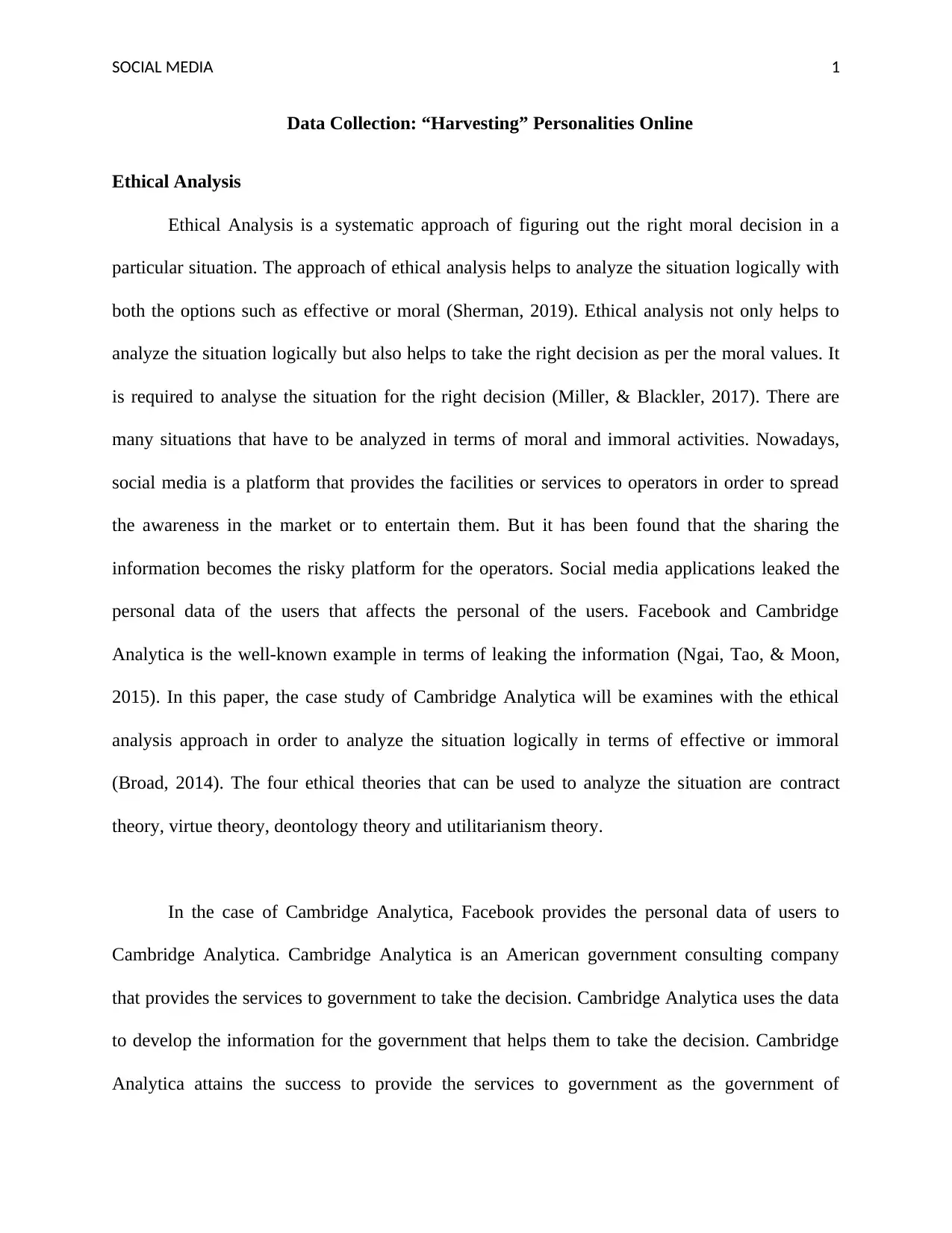
SOCIAL MEDIA 1
Data Collection: “Harvesting” Personalities Online
Ethical Analysis
Ethical Analysis is a systematic approach of figuring out the right moral decision in a
particular situation. The approach of ethical analysis helps to analyze the situation logically with
both the options such as effective or moral (Sherman, 2019). Ethical analysis not only helps to
analyze the situation logically but also helps to take the right decision as per the moral values. It
is required to analyse the situation for the right decision (Miller, & Blackler, 2017). There are
many situations that have to be analyzed in terms of moral and immoral activities. Nowadays,
social media is a platform that provides the facilities or services to operators in order to spread
the awareness in the market or to entertain them. But it has been found that the sharing the
information becomes the risky platform for the operators. Social media applications leaked the
personal data of the users that affects the personal of the users. Facebook and Cambridge
Analytica is the well-known example in terms of leaking the information (Ngai, Tao, & Moon,
2015). In this paper, the case study of Cambridge Analytica will be examines with the ethical
analysis approach in order to analyze the situation logically in terms of effective or immoral
(Broad, 2014). The four ethical theories that can be used to analyze the situation are contract
theory, virtue theory, deontology theory and utilitarianism theory.
In the case of Cambridge Analytica, Facebook provides the personal data of users to
Cambridge Analytica. Cambridge Analytica is an American government consulting company
that provides the services to government to take the decision. Cambridge Analytica uses the data
to develop the information for the government that helps them to take the decision. Cambridge
Analytica attains the success to provide the services to government as the government of
Data Collection: “Harvesting” Personalities Online
Ethical Analysis
Ethical Analysis is a systematic approach of figuring out the right moral decision in a
particular situation. The approach of ethical analysis helps to analyze the situation logically with
both the options such as effective or moral (Sherman, 2019). Ethical analysis not only helps to
analyze the situation logically but also helps to take the right decision as per the moral values. It
is required to analyse the situation for the right decision (Miller, & Blackler, 2017). There are
many situations that have to be analyzed in terms of moral and immoral activities. Nowadays,
social media is a platform that provides the facilities or services to operators in order to spread
the awareness in the market or to entertain them. But it has been found that the sharing the
information becomes the risky platform for the operators. Social media applications leaked the
personal data of the users that affects the personal of the users. Facebook and Cambridge
Analytica is the well-known example in terms of leaking the information (Ngai, Tao, & Moon,
2015). In this paper, the case study of Cambridge Analytica will be examines with the ethical
analysis approach in order to analyze the situation logically in terms of effective or immoral
(Broad, 2014). The four ethical theories that can be used to analyze the situation are contract
theory, virtue theory, deontology theory and utilitarianism theory.
In the case of Cambridge Analytica, Facebook provides the personal data of users to
Cambridge Analytica. Cambridge Analytica is an American government consulting company
that provides the services to government to take the decision. Cambridge Analytica uses the data
to develop the information for the government that helps them to take the decision. Cambridge
Analytica attains the success to provide the services to government as the government of
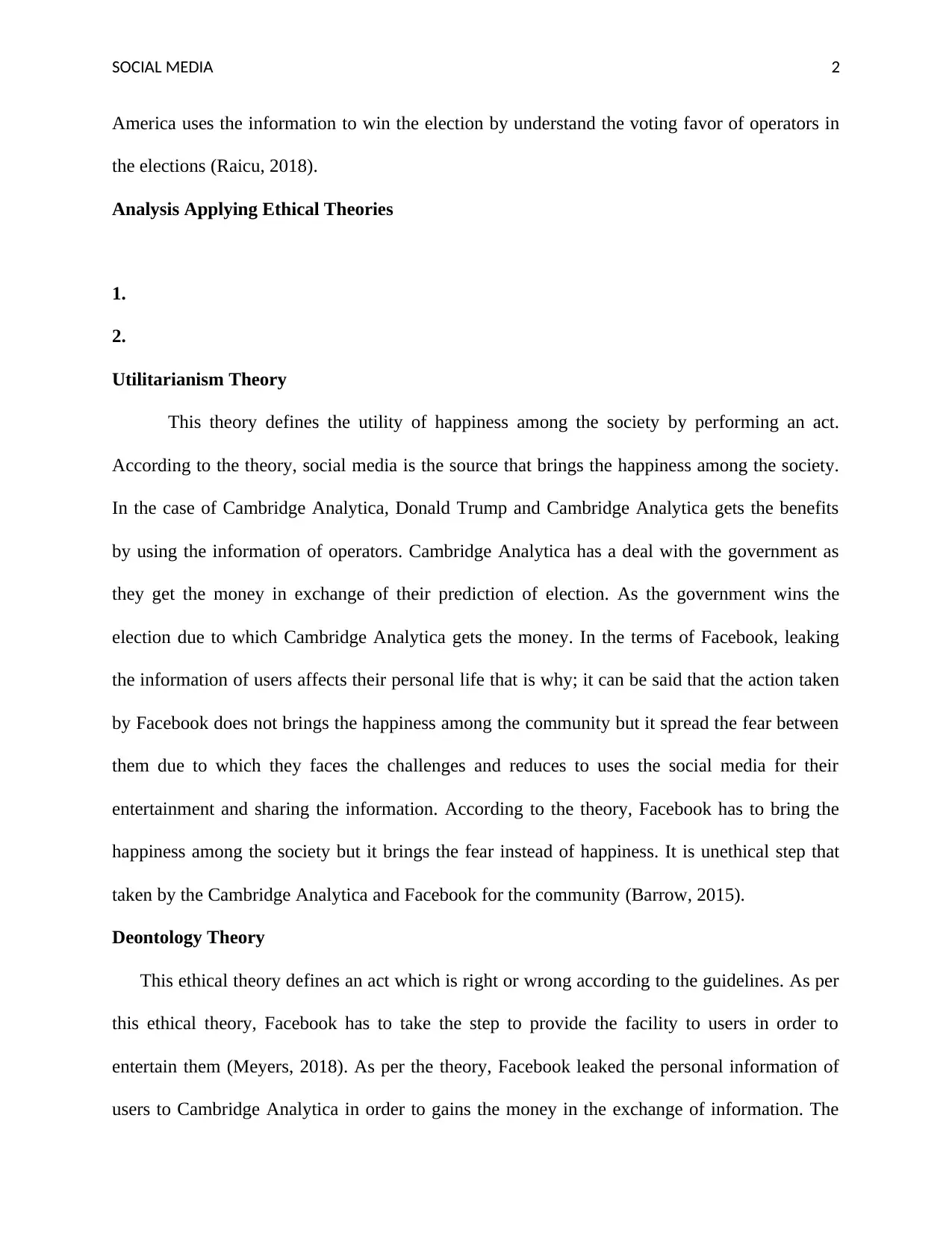
SOCIAL MEDIA 2
America uses the information to win the election by understand the voting favor of operators in
the elections (Raicu, 2018).
Analysis Applying Ethical Theories
1.
2.
Utilitarianism Theory
This theory defines the utility of happiness among the society by performing an act.
According to the theory, social media is the source that brings the happiness among the society.
In the case of Cambridge Analytica, Donald Trump and Cambridge Analytica gets the benefits
by using the information of operators. Cambridge Analytica has a deal with the government as
they get the money in exchange of their prediction of election. As the government wins the
election due to which Cambridge Analytica gets the money. In the terms of Facebook, leaking
the information of users affects their personal life that is why; it can be said that the action taken
by Facebook does not brings the happiness among the community but it spread the fear between
them due to which they faces the challenges and reduces to uses the social media for their
entertainment and sharing the information. According to the theory, Facebook has to bring the
happiness among the society but it brings the fear instead of happiness. It is unethical step that
taken by the Cambridge Analytica and Facebook for the community (Barrow, 2015).
Deontology Theory
This ethical theory defines an act which is right or wrong according to the guidelines. As per
this ethical theory, Facebook has to take the step to provide the facility to users in order to
entertain them (Meyers, 2018). As per the theory, Facebook leaked the personal information of
users to Cambridge Analytica in order to gains the money in the exchange of information. The
America uses the information to win the election by understand the voting favor of operators in
the elections (Raicu, 2018).
Analysis Applying Ethical Theories
1.
2.
Utilitarianism Theory
This theory defines the utility of happiness among the society by performing an act.
According to the theory, social media is the source that brings the happiness among the society.
In the case of Cambridge Analytica, Donald Trump and Cambridge Analytica gets the benefits
by using the information of operators. Cambridge Analytica has a deal with the government as
they get the money in exchange of their prediction of election. As the government wins the
election due to which Cambridge Analytica gets the money. In the terms of Facebook, leaking
the information of users affects their personal life that is why; it can be said that the action taken
by Facebook does not brings the happiness among the community but it spread the fear between
them due to which they faces the challenges and reduces to uses the social media for their
entertainment and sharing the information. According to the theory, Facebook has to bring the
happiness among the society but it brings the fear instead of happiness. It is unethical step that
taken by the Cambridge Analytica and Facebook for the community (Barrow, 2015).
Deontology Theory
This ethical theory defines an act which is right or wrong according to the guidelines. As per
this ethical theory, Facebook has to take the step to provide the facility to users in order to
entertain them (Meyers, 2018). As per the theory, Facebook leaked the personal information of
users to Cambridge Analytica in order to gains the money in the exchange of information. The
⊘ This is a preview!⊘
Do you want full access?
Subscribe today to unlock all pages.

Trusted by 1+ million students worldwide
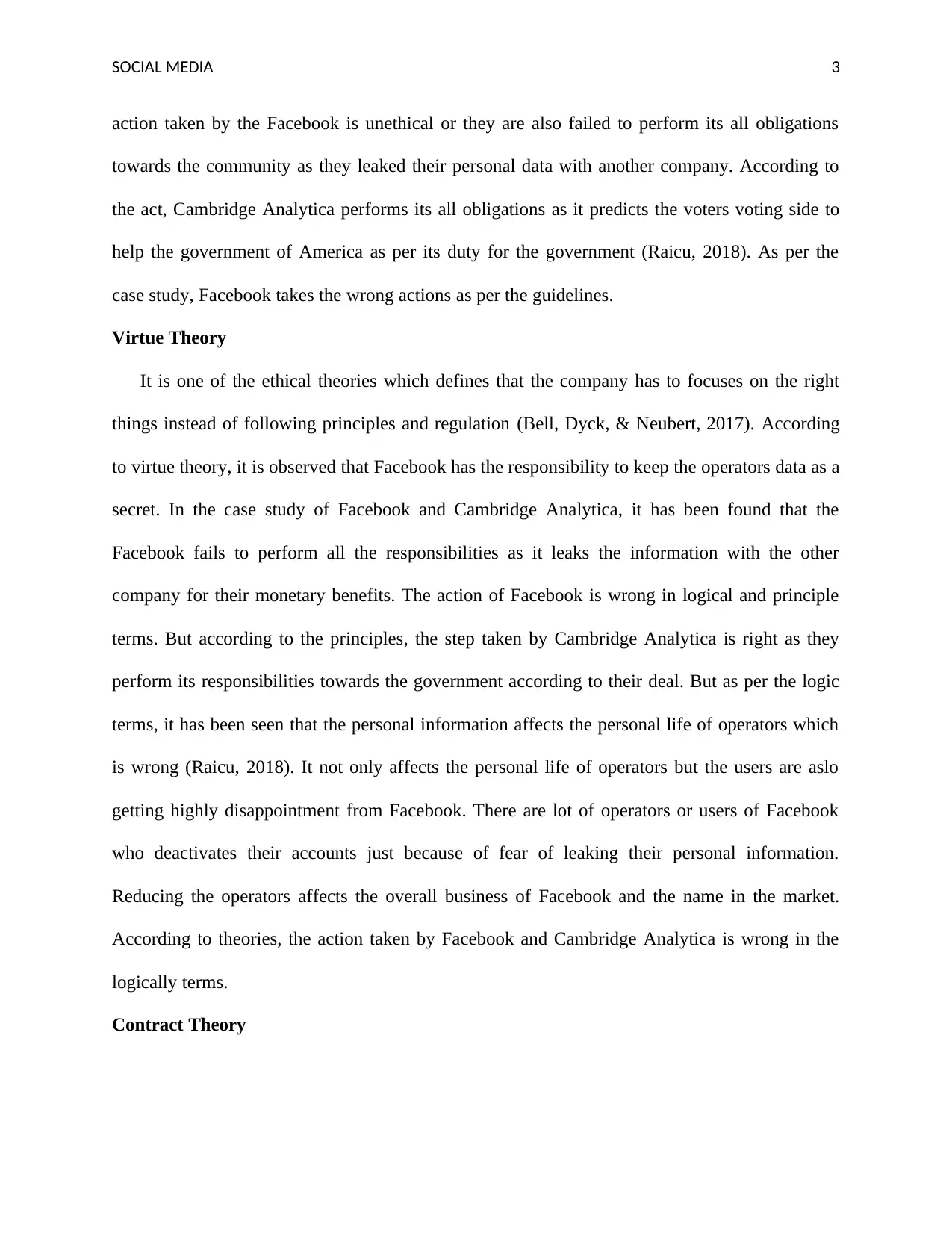
SOCIAL MEDIA 3
action taken by the Facebook is unethical or they are also failed to perform its all obligations
towards the community as they leaked their personal data with another company. According to
the act, Cambridge Analytica performs its all obligations as it predicts the voters voting side to
help the government of America as per its duty for the government (Raicu, 2018). As per the
case study, Facebook takes the wrong actions as per the guidelines.
Virtue Theory
It is one of the ethical theories which defines that the company has to focuses on the right
things instead of following principles and regulation (Bell, Dyck, & Neubert, 2017). According
to virtue theory, it is observed that Facebook has the responsibility to keep the operators data as a
secret. In the case study of Facebook and Cambridge Analytica, it has been found that the
Facebook fails to perform all the responsibilities as it leaks the information with the other
company for their monetary benefits. The action of Facebook is wrong in logical and principle
terms. But according to the principles, the step taken by Cambridge Analytica is right as they
perform its responsibilities towards the government according to their deal. But as per the logic
terms, it has been seen that the personal information affects the personal life of operators which
is wrong (Raicu, 2018). It not only affects the personal life of operators but the users are aslo
getting highly disappointment from Facebook. There are lot of operators or users of Facebook
who deactivates their accounts just because of fear of leaking their personal information.
Reducing the operators affects the overall business of Facebook and the name in the market.
According to theories, the action taken by Facebook and Cambridge Analytica is wrong in the
logically terms.
Contract Theory
action taken by the Facebook is unethical or they are also failed to perform its all obligations
towards the community as they leaked their personal data with another company. According to
the act, Cambridge Analytica performs its all obligations as it predicts the voters voting side to
help the government of America as per its duty for the government (Raicu, 2018). As per the
case study, Facebook takes the wrong actions as per the guidelines.
Virtue Theory
It is one of the ethical theories which defines that the company has to focuses on the right
things instead of following principles and regulation (Bell, Dyck, & Neubert, 2017). According
to virtue theory, it is observed that Facebook has the responsibility to keep the operators data as a
secret. In the case study of Facebook and Cambridge Analytica, it has been found that the
Facebook fails to perform all the responsibilities as it leaks the information with the other
company for their monetary benefits. The action of Facebook is wrong in logical and principle
terms. But according to the principles, the step taken by Cambridge Analytica is right as they
perform its responsibilities towards the government according to their deal. But as per the logic
terms, it has been seen that the personal information affects the personal life of operators which
is wrong (Raicu, 2018). It not only affects the personal life of operators but the users are aslo
getting highly disappointment from Facebook. There are lot of operators or users of Facebook
who deactivates their accounts just because of fear of leaking their personal information.
Reducing the operators affects the overall business of Facebook and the name in the market.
According to theories, the action taken by Facebook and Cambridge Analytica is wrong in the
logically terms.
Contract Theory
Paraphrase This Document
Need a fresh take? Get an instant paraphrase of this document with our AI Paraphraser
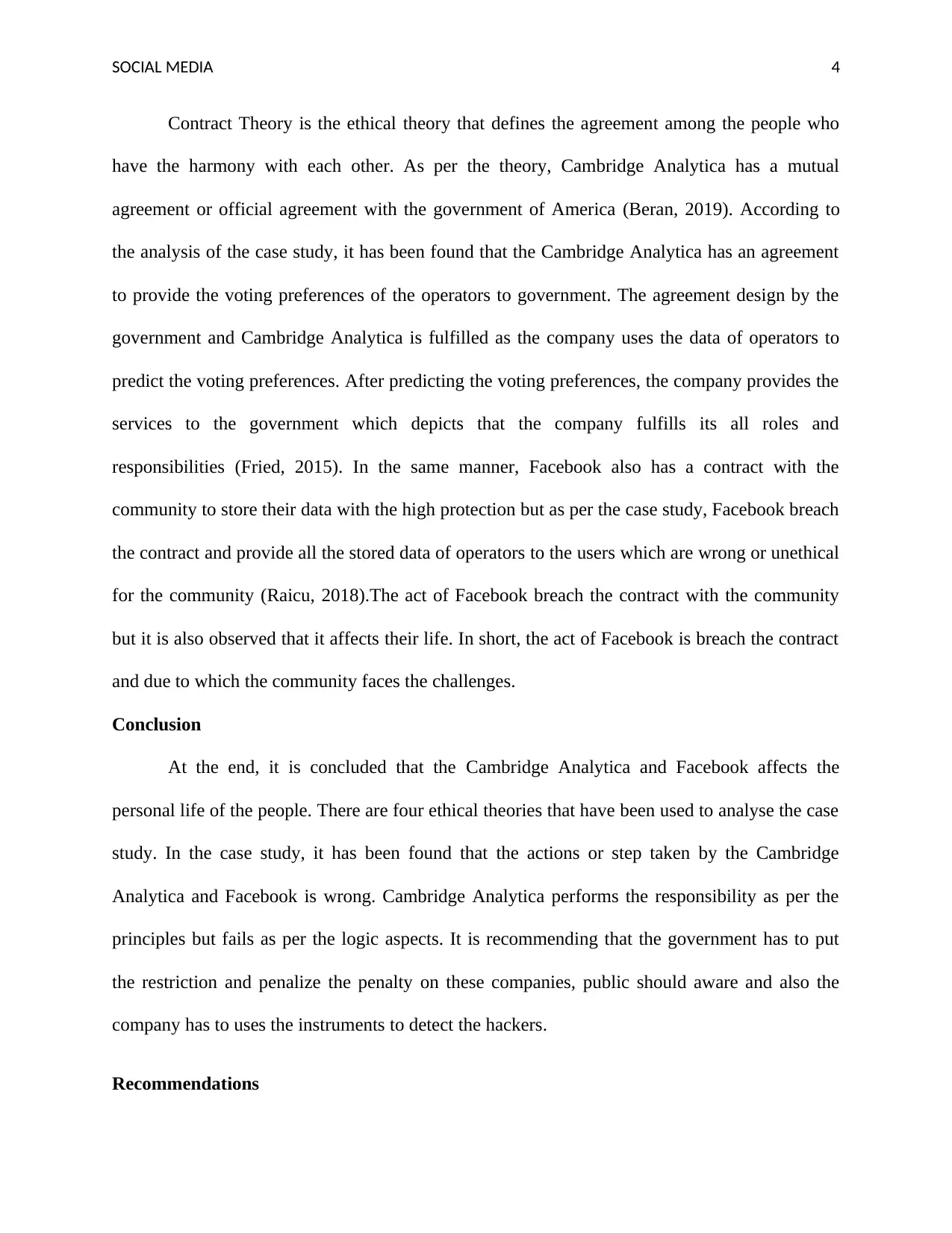
SOCIAL MEDIA 4
Contract Theory is the ethical theory that defines the agreement among the people who
have the harmony with each other. As per the theory, Cambridge Analytica has a mutual
agreement or official agreement with the government of America (Beran, 2019). According to
the analysis of the case study, it has been found that the Cambridge Analytica has an agreement
to provide the voting preferences of the operators to government. The agreement design by the
government and Cambridge Analytica is fulfilled as the company uses the data of operators to
predict the voting preferences. After predicting the voting preferences, the company provides the
services to the government which depicts that the company fulfills its all roles and
responsibilities (Fried, 2015). In the same manner, Facebook also has a contract with the
community to store their data with the high protection but as per the case study, Facebook breach
the contract and provide all the stored data of operators to the users which are wrong or unethical
for the community (Raicu, 2018).The act of Facebook breach the contract with the community
but it is also observed that it affects their life. In short, the act of Facebook is breach the contract
and due to which the community faces the challenges.
Conclusion
At the end, it is concluded that the Cambridge Analytica and Facebook affects the
personal life of the people. There are four ethical theories that have been used to analyse the case
study. In the case study, it has been found that the actions or step taken by the Cambridge
Analytica and Facebook is wrong. Cambridge Analytica performs the responsibility as per the
principles but fails as per the logic aspects. It is recommending that the government has to put
the restriction and penalize the penalty on these companies, public should aware and also the
company has to uses the instruments to detect the hackers.
Recommendations
Contract Theory is the ethical theory that defines the agreement among the people who
have the harmony with each other. As per the theory, Cambridge Analytica has a mutual
agreement or official agreement with the government of America (Beran, 2019). According to
the analysis of the case study, it has been found that the Cambridge Analytica has an agreement
to provide the voting preferences of the operators to government. The agreement design by the
government and Cambridge Analytica is fulfilled as the company uses the data of operators to
predict the voting preferences. After predicting the voting preferences, the company provides the
services to the government which depicts that the company fulfills its all roles and
responsibilities (Fried, 2015). In the same manner, Facebook also has a contract with the
community to store their data with the high protection but as per the case study, Facebook breach
the contract and provide all the stored data of operators to the users which are wrong or unethical
for the community (Raicu, 2018).The act of Facebook breach the contract with the community
but it is also observed that it affects their life. In short, the act of Facebook is breach the contract
and due to which the community faces the challenges.
Conclusion
At the end, it is concluded that the Cambridge Analytica and Facebook affects the
personal life of the people. There are four ethical theories that have been used to analyse the case
study. In the case study, it has been found that the actions or step taken by the Cambridge
Analytica and Facebook is wrong. Cambridge Analytica performs the responsibility as per the
principles but fails as per the logic aspects. It is recommending that the government has to put
the restriction and penalize the penalty on these companies, public should aware and also the
company has to uses the instruments to detect the hackers.
Recommendations
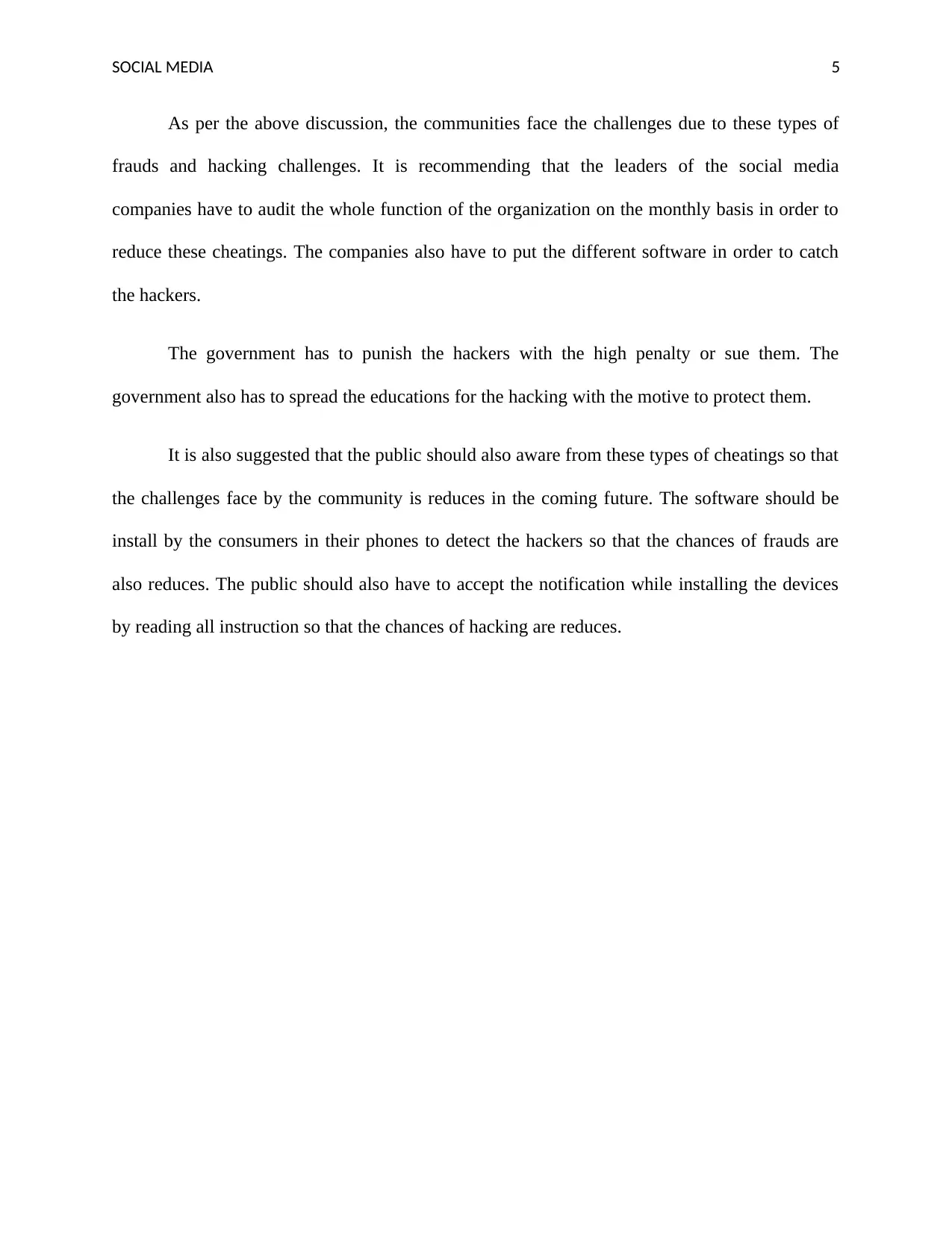
SOCIAL MEDIA 5
As per the above discussion, the communities face the challenges due to these types of
frauds and hacking challenges. It is recommending that the leaders of the social media
companies have to audit the whole function of the organization on the monthly basis in order to
reduce these cheatings. The companies also have to put the different software in order to catch
the hackers.
The government has to punish the hackers with the high penalty or sue them. The
government also has to spread the educations for the hacking with the motive to protect them.
It is also suggested that the public should also aware from these types of cheatings so that
the challenges face by the community is reduces in the coming future. The software should be
install by the consumers in their phones to detect the hackers so that the chances of frauds are
also reduces. The public should also have to accept the notification while installing the devices
by reading all instruction so that the chances of hacking are reduces.
As per the above discussion, the communities face the challenges due to these types of
frauds and hacking challenges. It is recommending that the leaders of the social media
companies have to audit the whole function of the organization on the monthly basis in order to
reduce these cheatings. The companies also have to put the different software in order to catch
the hackers.
The government has to punish the hackers with the high penalty or sue them. The
government also has to spread the educations for the hacking with the motive to protect them.
It is also suggested that the public should also aware from these types of cheatings so that
the challenges face by the community is reduces in the coming future. The software should be
install by the consumers in their phones to detect the hackers so that the chances of frauds are
also reduces. The public should also have to accept the notification while installing the devices
by reading all instruction so that the chances of hacking are reduces.
⊘ This is a preview!⊘
Do you want full access?
Subscribe today to unlock all pages.

Trusted by 1+ million students worldwide
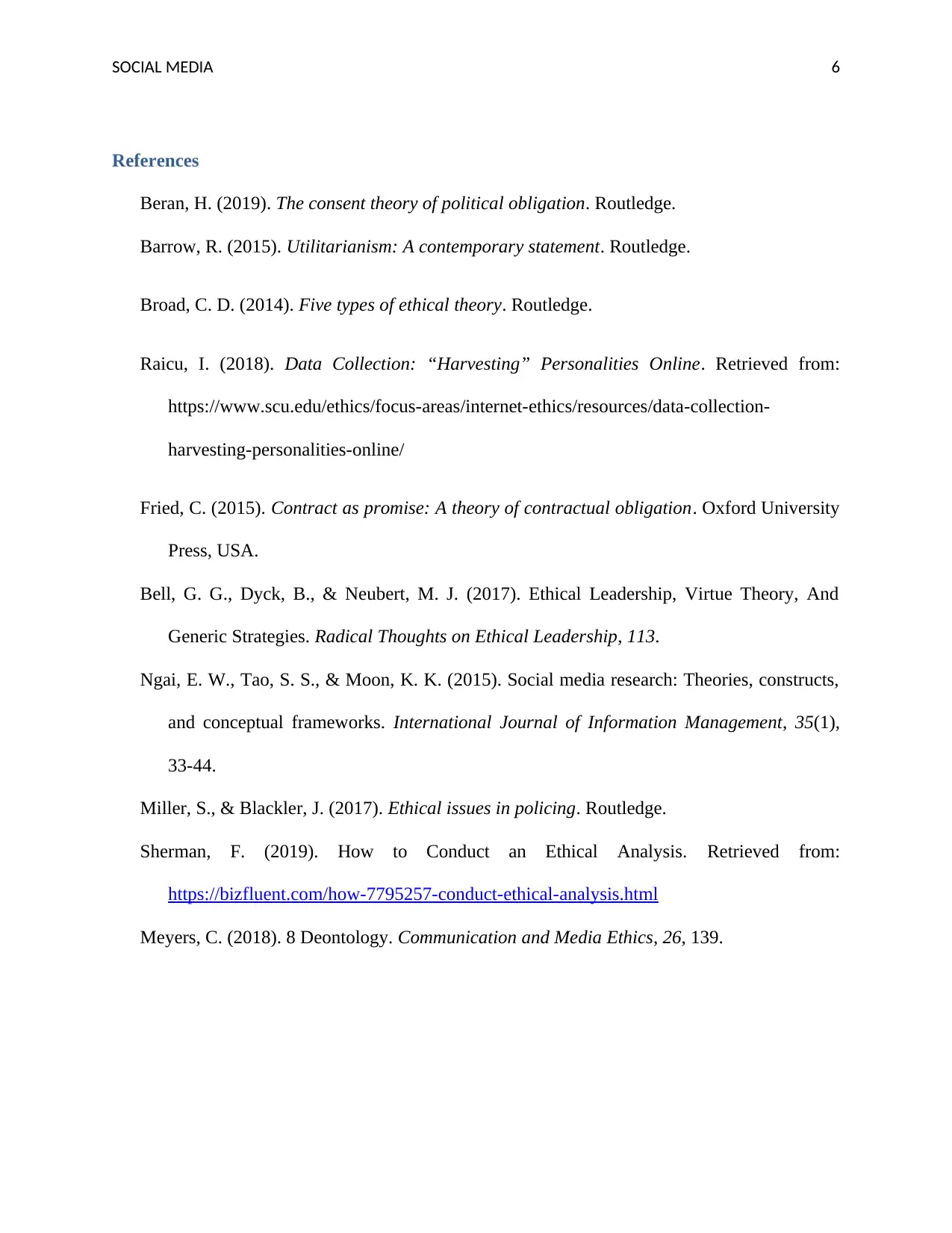
SOCIAL MEDIA 6
References
Beran, H. (2019). The consent theory of political obligation. Routledge.
Barrow, R. (2015). Utilitarianism: A contemporary statement. Routledge.
Broad, C. D. (2014). Five types of ethical theory. Routledge.
Raicu, I. (2018). Data Collection: “Harvesting” Personalities Online. Retrieved from:
https://www.scu.edu/ethics/focus-areas/internet-ethics/resources/data-collection-
harvesting-personalities-online/
Fried, C. (2015). Contract as promise: A theory of contractual obligation. Oxford University
Press, USA.
Bell, G. G., Dyck, B., & Neubert, M. J. (2017). Ethical Leadership, Virtue Theory, And
Generic Strategies. Radical Thoughts on Ethical Leadership, 113.
Ngai, E. W., Tao, S. S., & Moon, K. K. (2015). Social media research: Theories, constructs,
and conceptual frameworks. International Journal of Information Management, 35(1),
33-44.
Miller, S., & Blackler, J. (2017). Ethical issues in policing. Routledge.
Sherman, F. (2019). How to Conduct an Ethical Analysis. Retrieved from:
https://bizfluent.com/how-7795257-conduct-ethical-analysis.html
Meyers, C. (2018). 8 Deontology. Communication and Media Ethics, 26, 139.
References
Beran, H. (2019). The consent theory of political obligation. Routledge.
Barrow, R. (2015). Utilitarianism: A contemporary statement. Routledge.
Broad, C. D. (2014). Five types of ethical theory. Routledge.
Raicu, I. (2018). Data Collection: “Harvesting” Personalities Online. Retrieved from:
https://www.scu.edu/ethics/focus-areas/internet-ethics/resources/data-collection-
harvesting-personalities-online/
Fried, C. (2015). Contract as promise: A theory of contractual obligation. Oxford University
Press, USA.
Bell, G. G., Dyck, B., & Neubert, M. J. (2017). Ethical Leadership, Virtue Theory, And
Generic Strategies. Radical Thoughts on Ethical Leadership, 113.
Ngai, E. W., Tao, S. S., & Moon, K. K. (2015). Social media research: Theories, constructs,
and conceptual frameworks. International Journal of Information Management, 35(1),
33-44.
Miller, S., & Blackler, J. (2017). Ethical issues in policing. Routledge.
Sherman, F. (2019). How to Conduct an Ethical Analysis. Retrieved from:
https://bizfluent.com/how-7795257-conduct-ethical-analysis.html
Meyers, C. (2018). 8 Deontology. Communication and Media Ethics, 26, 139.
1 out of 7
Related Documents
Your All-in-One AI-Powered Toolkit for Academic Success.
+13062052269
info@desklib.com
Available 24*7 on WhatsApp / Email
![[object Object]](/_next/static/media/star-bottom.7253800d.svg)
Unlock your academic potential
Copyright © 2020–2026 A2Z Services. All Rights Reserved. Developed and managed by ZUCOL.





